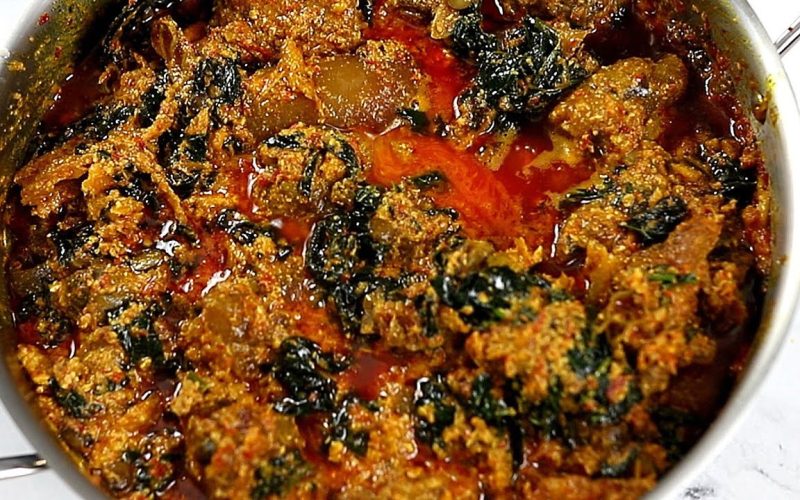The different ethnic groups in Nigeria are blessed with varieties of foods that represent their culture. We will be discussing the preparation of a popular Edo state dish called egusi soup (melon).
Some people substitute with pumpkin seeds when they are not able to acquire melon seeds.
Different methods can be used in preparing Egusi soup
- Frying method
- Cake method
- Molding method
The third method involves molding the grounded seeds into balls and dropping them in the soup. While the rest is cooked as the caking method.
The frying method is what we will be looking at in this article. However, people who prefer little or no oil in their meals tend to gravitate towards the caking method.
What you need to prepare Egusi soup
- Grounded Melon seeds
- Blended Pepper
- Palm Oil
- Crayfish
- Vegetable leaves of your choice. Some use the bitter leaf, others prefer pumpkin leaf, and there’s also an option of waterleaf.
- The meat of your choice; goat meat or cow meat.
- Stockfish
- Meat and Fish stock (water used in cooking the meat and fish)
- Seasoning
How to prepare Egusi soup?
Like every soup, you start with the ingredients.
Grind the melon seeds, blend the crayfish, pepper, and onions.
The stockfish should be thoroughly washed to take out every dirt in it and then cooked for a few minutes.
The vegetable leaf or leaves of choice (some people prefer using more than one type) should be rinsed three to four times then cut into bits.
The bitter leaf should be washed until it loses its bitter taste (or until it gets to the way you want it). Meat should be washed and cooked.
When the ingredients are all ready, you can go into the cooking process properly.
- We are starting with the oil (frying method): Put the oil in a dry pot and heat it. Once the oil is translucent, add the egusi seeds to it and stir until all the milled seeds turn yellow. Stirring can be between 7-10 minutes.
- The next step is to add water to the pot: Since we already have our meat and fish stock, we will start with that. Add the stock in bits until you have added everything. Check the texture; if it is still too thick, you can add water to the pot until it becomes good enough.
- For those using bitter leaf, it is advisable to add it now as it takes a longer time to become soft than other vegetables.
- Now you let it cook for a while but stir periodically to avoid burning. Also, the water content might have reduced at this point, and the soup may get thicker, if you don’t like it that way, it is okay to add a little amount of water to it. Some people just keep on stirring until they notice the oil has separated from the egusi seeds.
- After about 15 to 20 minutes of stirring periodically, you can add your pepper, crayfish, stockfish, meat, and whatever (Gwon-Gwon) chewable you may have prepared for your soup. For those using pumpkin leaves or other vegetables, you add them now.
- Taste to check and add salt or seasoning until you are okay with it. You can also add water if it’s still too thick.
- Allow it to cook for another 5 minutes, and then it is ready.
Like other Nigerian soups, it can be eaten with Eba, Fufu, Pounded yam, Semovita, or Wheat flour. Any swallow of your choice.
Benefits of Eating This delicious local dish
Asides from the obvious need to enjoy a good meal, egusi soup has other health benefits. Egusi seed has lots of nutrients present.
Some of its contents and their benefits are:
- Fatty acid: The unsaturated fatty acid present in these seeds aids the reduction of blood cholesterol, thereby reducing the chances of having heart disease.
- vitamins: Some vitamins like Vitamins A, B1, B2, and E are present in egusi seed. They help in the metabolism of fats and oil, also in taking care of the skin. Wrinkles, dry skin, and other skin problems are reduced due to the anti-aging properties of vitamin E. Vitamin A helps in maintaining good eyesight.
- Malnutrition is considerably averted due to its protein, mineral and vitamin contents
- Blood-related health conditions like Anemia can be prevented by eating egusi regularly. Its potassium, magnesium, calcium, and iron contents help to ensure that. These minerals, together with phosphorus, also help in the development and formation of bones.
- Ulcer and other health conditions related to oxidation can be checked by the antioxidants present in egusi seeds.
These above are some of the benefits taking egusi can give one’s body. However, we must be careful not to take an excess of it as it can lead to excessive weight gain due to its fats content.
Also, depression and even cancer can be caused by the omega-six fatty acids present in them.








